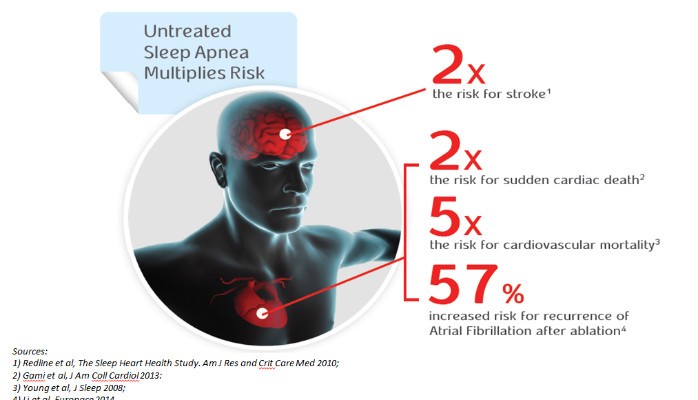
Obstructive Sleep Apnea (OSA) has been linked to several illnesses such as Diabetes, high blood pressure, and adult asthma. One of the most serious risks for those with OSA is an increased chance of stroke. According to The National Stroke Association, OSA causes high blood pressure and low oxygen levels in the brain, which raises the likelihood of a stroke.
OSA also can cause different types of strokes: ischemic strokes which occur when there is an obstruction in a blood vessel supplying blood to the brain; and cardioembolic strokes which occur when the heart pumps unwanted material into the brain, causing damage to the brain tissue. The Mayo Clinic found, “Moderate to severe sleep apnea has been shown to increase the risk of ischemic stroke by as much as three times in men.” Another study, also done at the Mayo Clinic, shows cardioembolic stroke is more common in patients with OSA than in patients without it. One of best ways to prevent potential stroke if you have OSA symptoms is to get tested.
Once diagnosed with OSA, patients have a choice of treatment options. The standard treatment option is the Continuous Positive Airway Pressure (CPAP) machine, which is appropriate for all levels of sleep apnea, but does have a high cost and lower-than-recommended use consistency rate. However, there are other options as mild-to-moderate patients with OSA can also use Oral Appliance Therapy (OAT), like a Mandibular Advancement Devise (MAD).
The American Academy of Sleep Medicine recommends OTAs for mild-to-moderate OSA. The OAT should be administered under the following guidelines:
Many patients find MADs easier to use than the CPAP machine, and it boasts higher rates of consistent usage; in fact, nearly half of all patients stop using their CPAP machine within three weeks. This lack of consistent use is due to claustrophobia from the CPAP masks, congestion, and uneasiness in sleep due to the awkwardness of wearing the required CPAP gear.
OATs, conversely, are gaining popularity because of they are adjustable, portable, and are easier to use. While most often recommended for mild-to-moderate apnea only, OATs are starting to show significant success in other levels of apnea. In fact, the preliminary study called the Oracles Study has shown a 79% success rate with OATs regardless of severity of apnea. This is a positive move for OATs as they are proving to be a more patient-friendly treatment for OSA.